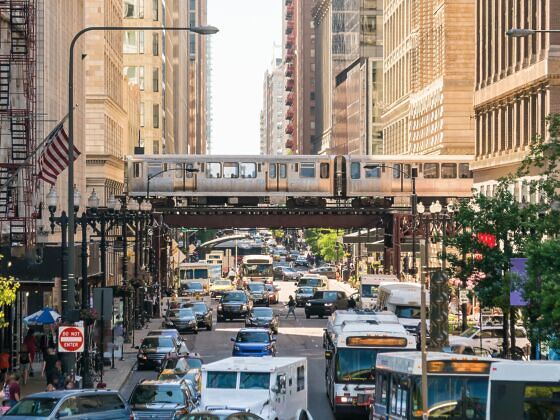During the Covid-19 pandemic, cities across the United States began taking broad strokes to become more bike- and pedestrian-friendly. Some cities, like Denver, launched new initiatives to get people out of their cars, while many denser East Coast cities ramped up existing efforts to construct separated bike lanes and, in certain cases, even turn entire streets over to bikes. Despite some resistance the efforts gained enough traction to result in an unprecedented boom in urban bike commuting across the country. But a darker effort has taken priority in Chicago, America’s third-largest city and a place known for its public transit system and general urban efficiency. In 2008, then-Mayor Richard M. Daley struck a deal with investors in Abu Dhabi that leased the city’s 36,000 parking meters to the government-backed investors for 75 years. The result is an absurd situation where Chicago’s streets are effectively held hostage by the investment group – preventing modernization to more sustainable forms of transportation.


The Bad Deal in Chicago That Will Keep It From Being Bike-Friendly Until 2084
The deal came at a time when Chicago needed money. The Great Recession had hit the city hard, and the government was severely short on cash. Mayor Daley flew to Abu Dhabi under the guise of “selling Chicago as a good place to do business,” as the New York Times reported, and the most notable result of this effort was a deal to lease the city’s parking meters. All money generated by the meters, or that could have been should they be removed, closed off, or blocked, would be collected by the subsidiary formed by the investors. In return, the city of Chicago received $1.1 billion. Daley committed the meters to the investors for 75 years – and legal experts have yet to find a way for the city to get out of the lease.
@jacobfriedmanrealtor Mayor Daley sold us out! What do you think of this deal? #chicago #chicagotiktok #parking #chicagohistory #CapCut ♬ trinity tunez_ Not Like Us Instrumental – trinitytunez_
Off the cusp this doesn’t seem so bad – Chicago needed money. The investors provided that money, and in return would get 75 years worth of pocket change that drivers would be spending on the parking meters anyway. But what seemingly wasn’t taken into account was the fact that major cities are not static – that is, they don’t stay the same for 75 years. Nor does society. Cities grow, business needs change, and the tastes of citizens evolve to reflect contemporary technologies and trends.
Investors formed a new company called Chicago Parking Meters LLC, removing automatic skepticism and concerns about their location. The meters generate about $200 million per year, which adds up to some $15 billion over the life of the lease. That’s a massive cash grab for the investors, with all of it leaving the city where it was generated.
But Chicago is stuck in the lease, and as a result, its citizens aren’t encouraged towards sustainable modes of street transit where the meters are present. That money has to be paid, and the government doesn’t want to pay it – they want drivers to pay it. Therefore, the meters must stay in place in favor of separated bike lanes or increased walkability. The city is mandated to pay for the meters’ performance even when they don’t perform, therefore offsetting any economic benefit Chicago could gain by encouraging people to get out of their cars. If the city removes a meter, it must pay what that meter would have generated through 2084 – which, as should come as no surprise, is preventing further bike or bus lane development in many instances.
There’s a host of other reasons why the deal is bad for the city and its residents, including that it requires meters in places where business owners don’t want them and otherwise inhibits or alters development and repurposing plans. The deal is so bad for Chicagoans that it’s been labeled a “lesson in worst practices” by the Better Government Association.
The most ludicrous aspect of the deal is that the money generated by the meters, or that would have been when the meters aren’t active, isn’t even helping the city. It’s heading overseas into the pockets of wealthy investors with no interest in making Chicago a better place to live. Drivers are clogging up the streets, lining the parking spaces, and killing pedestrians at record numbers – the city has among the highest rates of pedestrian accidents and deaths in the country. The deal is hurting the economy – along with residents and visitors – at the same time.